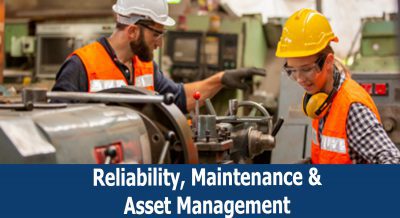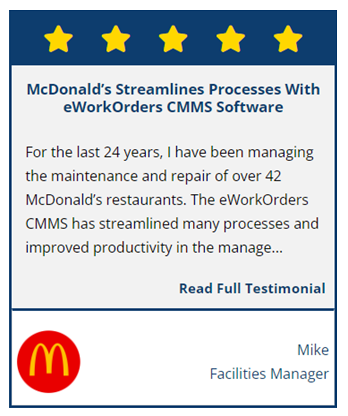
As industries continue to evolve and grow, the demand for complex, capital-intensive assets has risen. From healthcare and Manufacturing Facilities to utilities and beyond, these assets play a critical role in ensuring business success. However, the maintenance and management of these assets have become increasingly challenging in the face of rapid technological advancements. Maintenance managers and staff are often left out of the development process, leading to a lack of input and understanding of how to properly maintain these assets. Furthermore, strict client demands for product quality and timely delivery can discourage organizations from conducting maintenance due to the required downtime. As a result, it is crucial to adopt best practices for maintenance and asset management to maximize asset performance and achieve business objectives.
 What is Reliability-based Maintenance?
What is Reliability-based Maintenance?
Maintenance reliability is an essential part of any asset management program, ensuring that equipment and systems are operating as expected and providing maximum value to the organization. There are numerous types of maintenance reliability, each with its unique set of challenges and considerations. Understanding these types of maintenance reliability is crucial for developing effective maintenance strategies and optimizing asset performance. In this article, we will explore the concept of Reliability-Based Maintenance and delve into the various types of reliability that are crucial to managing assets and equipment effectively.
The Key Types of Asset Reliability
Asset Reliability: This type of reliability focuses on ensuring that an organization’s assets (such as machines, buildings, and equipment) are performing optimally to support business operations. Asset reliability often involves analyzing data to identify areas for improvement and implementing maintenance strategies to increase the lifespan of assets.
Maintenance Reliability: Maintenance reliability is the ability of maintenance processes to perform as intended, with minimal error or risk of failure. This type of reliability includes maintaining accurate records, utilizing standardized procedures, and implementing quality control measures to ensure that maintenance activities are completed effectively.
Equipment Reliability: Equipment reliability is the measure of how well equipment performs its intended function over a given period of time. It involves analyzing data on equipment failures, predicting and preventing potential failures, and implementing maintenance and repair strategies to increase the lifespan of the equipment.
Operational Reliability: Operational reliability focuses on the ability of a system or process to perform as intended under normal operating conditions. This type of reliability often involves monitoring systems in real-time to detect potential issues before they cause downtime or other disruptions.
Process Reliability: Process reliability is the measure of how consistently a process produces the desired results over time. This type of reliability often involves identifying potential sources of error or variability, implementing process controls and quality assurance measures, and monitoring the process to ensure that it is performing as intended.
System Reliability: Refers to the ability of an entire system to function as expected, which includes the reliability of individual assets and equipment.
Software Reliability: Refers to the ability of software to function as expected without failure or errors.
Human Reliability: This type of reliability focuses on the role of human factors in maintenance and asset management. It considers the impact of human error, fatigue, training, and other factors on the reliability and performance of assets.
Environmental Reliability: This refers to the ability of an asset to operate in various environmental conditions, such as temperature, humidity, and vibration. Ensuring environmental reliability can help prevent failures due to factors outside of normal operating conditions.
Manufacturing Reliability: Refers to the ability of equipment or systems to be manufactured consistently to meet design specifications and perform reliably.
Supply Chain Reliability: Refers to the ability of suppliers and vendors to provide components, parts, and materials in a timely and reliable manner, without delays or quality issues that could impact asset or equipment reliability.
Calibration Reliability: Refers to the ability of instruments and measuring devices to maintain accurate measurements over time, and to be calibrated regularly to ensure their reliability.
Data Reliability: Refers to the ability of data collection, storage, and analysis systems to provide accurate and reliable data, which is essential for making informed decisions about asset management and maintenance.
Safety Reliability: This type of reliability focuses on ensuring that systems and equipment are designed, installed, and maintained to meet safety requirements and minimize the risk of accidents or incidents that could cause harm to people, property, or the environment.
Availability Reliability: Availability reliability is the probability that a system or component will be operational and available to perform its intended function when required. It takes into account planned downtime for maintenance, repair, or replacement.
Procedural Reliability: This type of reliability focuses on the processes and procedures that are in place to maintain an asset. This includes things like scheduling maintenance tasks, documenting maintenance procedures, and ensuring proper training of maintenance personnel.
Financial Reliability: Financial reliability refers to the ability of an asset to generate a return on investment over its lifecycle. This includes factors such as maintenance costs, repair costs, and the overall value of the asset to the organization.
A Centralized Solution for Managing Maintenance Reliability
Computerized maintenance management systems (CMMS) are powerful tools that can help organizations manage all types of maintenance reliability effectively. By providing a centralized platform for tracking, scheduling, and managing maintenance activities, CMMS can streamline maintenance operations, improve asset performance, and reduce downtime. CMMS can help manage different types of maintenance reliability, such as preventive maintenance, predictive maintenance, corrective maintenance, and condition-based maintenance. By automating maintenance tasks and providing real-time visibility into equipment health and maintenance needs, CMMS can help organizations prioritize maintenance tasks, optimize maintenance schedules, and reduce the risk of equipment failures. Overall, CMMS can help organizations achieve and maintain maintenance reliability across all aspects of asset management, leading to improved efficiency, reduced costs, and increased profitability.
Final Thoughts
In summary, maintenance reliability is essential for ensuring that assets and equipment perform as expected and deliver maximum value to the organization. There are several types of maintenance reliability, including preventive, predictive, corrective, condition-based, and more. Each type requires a unique set of strategies and considerations to achieve optimal results. CMMS can help organizations manage all types of maintenance reliability effectively by providing a centralized platform for tracking, scheduling, and managing maintenance activities. By automating maintenance tasks, optimizing maintenance schedules, and providing real-time visibility into equipment health and maintenance needs, CMMS can help organizations achieve and maintain maintenance reliability across all areas of asset management, leading to improved efficiency, reduced costs, and increased profitability.
